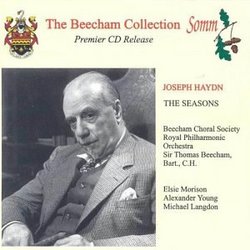| All Artists: Franz Joseph Haydn, Thomas Beecham, Royal Philharmonic Orchestra, Elsie Morison, Alexander Young Title: Haydn: The Seasons Members Wishing: 0 Total Copies: 0 Label: Somm Recordings Release Date: 1/27/2004 Genre: Classical Styles: Opera & Classical Vocal, Historical Periods, Classical (c.1770-1830), Modern, 20th, & 21st Century Number of Discs: 2 SwapaCD Credits: 2 UPC: 675754620721 |
Search - Franz Joseph Haydn, Thomas Beecham, Royal Philharmonic Orchestra :: Haydn: The Seasons
 | Franz Joseph Haydn, Thomas Beecham, Royal Philharmonic Orchestra Haydn: The Seasons Genre: Classical
|
Larger Image |
CD Details |
CD ReviewsEdward Greenfield wrote in Gramophone Record Collector | Mons, Belgium | 03/27/2006 (5 out of 5 stars) "Though there are points for academics and others to criticise in this characterful reading of Haydn's last oratorio, this is a version to recommend to anyone who has ever responded to the charm and vivacity of Beecham in Haydn. It was mainly recorded in November 1956, but Beecham - who liked to record when the mood took him - did not get round to completing it until April 1958. It is a performance which glows from beginning to end, and I am delighted that, in default of EMI taking up the challenge, Somm has issued it on CD in excellent transfers. First the detailed reservations. Few, I imagine, will worry over much about the way Beecham has discreetly orchestrated the relatively brief passages of recitative where Haydn has simply specified keyboard accompaniment: after all, most of the recitative is already orchestrated. More serious, though not too damaging, is the cut of 43 bars towards the end of the orchestral introduction. Then, characteristically, Beecham retouches the detailed scoring to heighten the colourful imagery of the text.
So the tolling of the curfew bell in the final chorus of `Summer' (disc 1, track 22, 2'46"), which Haydn illustrates on the horn, finds Beecham adding a real bell; at the end of `Autumn' he enhances the stamp of the rustic dance with cymbal-strokes. None of this comes near to the radical nature of the reorchestration he sanctioned in his last recording of Handel's Messiah, but there, too, he was intent on presenting the score as vividly as possible. That accords with his decision to record the work in English, using a translation by Dennis Arundell. This may have its infelicities, but it works much better than the traditional translation based on the original poem of James Thomson, from which Baron von Swieten drew his German text. The number which illustrates the Beecham magic at its most compelling is Simon's first aria in the opening section, `Spring', here translated as `Now daily runs the farmer's boy': Beecham has the bassoon vividly illustrating the running boy with bouncing rhythms and staccato semi-quavers. Michael Langdon is a firm bass soloist, never allowing an intrusive aspirate in his running semiquavers. Elsie Morison is in ravishing form, headily pure in every register, and the tenor, Alexander Young, is equally clear, fresh and true. Though the chorus cannot quite match latterday groups in polish or precision, and the recording balance makes them less clear than they might be, the vigour of the singing is never in doubt, with the RPO soloists relishing Beecham's rhythmic and melodic nuances. " |

 Track Listings (22) - Disc #1
Track Listings (22) - Disc #1